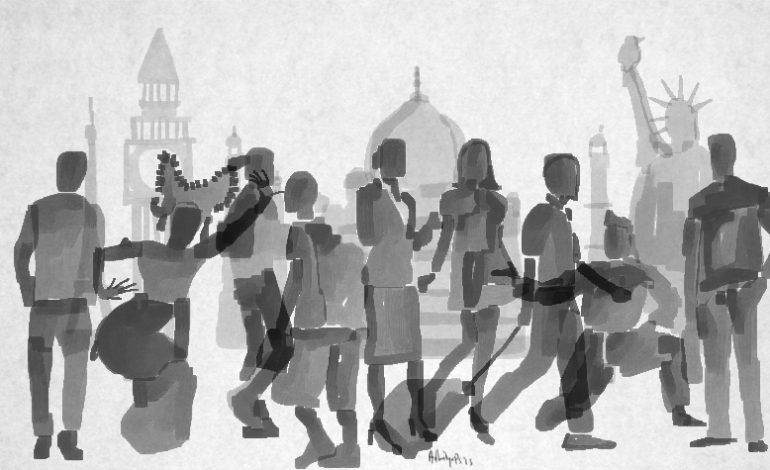The Indonesian Diaspora Broken Down

It was a warm Perth night on the balcony of Rosa’s apartment, where four of us discussed everything and anything about diasporic Indonesians. Between sips of sparkling wine and mouthfuls of bakmi goreng, chicken satay, potato fritters, vegetable stir-fry and kerupuk, we chuckled over bits of information and gossip that each one of us brought to the table.
“Yes, I know her, I met her once… I think” or, “No, I don’t really know her very well” and, “Oh, is that what she’s up to now?” were frequent responses to some of the tales of the Indonesians in Perth. So many people getting up to so many things! That night it dawned on me that diasporic Indonesians –Indonesians living abroad long-term – are truly an amazing bunch, coming in all shapes and sizes and displaying varying degrees of Indonesian-style sociability and affinity.
Here is a guide to the more common types of female Indonesian diaspora that I have encountered in my years of being one.
The social butterfly flutters from one (usually large) butterfly gathering to another on a regular basis and with surprising frequency. She thrives on the attention of other butterflies who compliment her on her extravagant style, which often does not come cheaply. The high frequency of butterfly gatherings means communication and miscommunication have equal chances of occurring. Friendships are superficial, and falling-outs are commonplace. Butterflies can be identified by the unmistakable effort they make to appear eye-catching. Don’t go near butterflies if you want deep and meaningful friendships.
The worker bee moves regularly between home and workplace and has little time for social activities outside the workplace and outside working hours. She thrives on the thought that life is all about work and is generally unaware that there is life beyond work. On the rare times that she socializes, she wonders why everyone else is not a worker bee like herself. Worker bees can be identified by their low-key attire and, in conversations with non-worker-bees, may come across as being smart-asses or complete bores. Don’t go near worker bees if you want excitement in your life.
The chameleon is overly keen to adapt the dominant culture of her new home. She does this by disengaging with the rest of the Indonesian diaspora and strangely cultivating a dislike for Indonesian food. She thrives on hanging out exclusively with people from the dominant culture and keeps a safe distance from social butterflies, whom she finds embarrassing. Chameleons can be identified by their uncanny resemblance to people of the dominant culture, not just in style but in mannerism and behavior. Don’t go near chameleons if you like Indonesian food and/or are a social butterfly.
The bookworm may not necessarily like books, but must deal with books because she is a student; this category mainly applies to postgraduate types on scholarship (not posh undergraduates financed by rich parents back home). The bookworm would love to socialize but can’t, because she knows she must save money and keep her donors happy. She thrives on getting high marks and praise from her supervisors. Bookworms can be identified by their unmistakably drab, student type attire. Don’t go near bookworms if you think their scholarship-funded lifestyle might evoke your empathy and make you donate your lifesavings to support them.
The proud garuda is a frequent visitor to the local consulate or Indonesian mission. Like other members of the diaspora, she goes there for the food, but she actually believes in the good of ceremonies hosted by the mission. She finds it hard to understand why others in the diaspora would rather take a walk than listen to mind-numbing speeches. She thrives on dressing up in Indonesian national attire and being friendly with staff at the mission. Garudas can be identified by their excellent skills at making non-garudas feel guilty for not being garudas. Don’t go near garudas if you don’t think “right or wrong, my country”.
The soldier ant builds her nest in her new home country from the ground up, planting her roots – with her typically Indonesian spouse – through a small business or local venture. Secretly she would like to be a social butterfly but her background as a bookworm has somewhat forced her to become a worker bee with a modest social life. She thrives on small-business tax breaks and tax returns. Soldiers can be identified by their general lack of interest in Indonesian and dominant culture politics. Don’t go near soldiers if you are a keen follower of Indonesian politicians’ antics.
The lone wolf is content and relaxed in her new home. Her wealth of experience makes her constantly curious and critical but she knows when to be appreciative of the dominant culture where appreciation is due. Lone wolves can be identified by their slight discomfort at being around diaspora members who fall strictly into the other categories, so they may come across as being aloof and/or ignorant. The lone wolf thrives on personal relationships, including with other lone wolves. Don’t go near a lone wolf if you are looking for a regular participant at your monthly arisan.
Next time you meet an Indonesian woman living abroad, try to identify her diasporic category. It can be most satisfying.
About Prap Wn
Prapti worked as a Jakarta-based journalist in the 1990s before following her heart and ending up in Perth, Western Australia, where she now lives with her husband and two teenage children. She works so she can travel as much as her credit card will carry her.






















